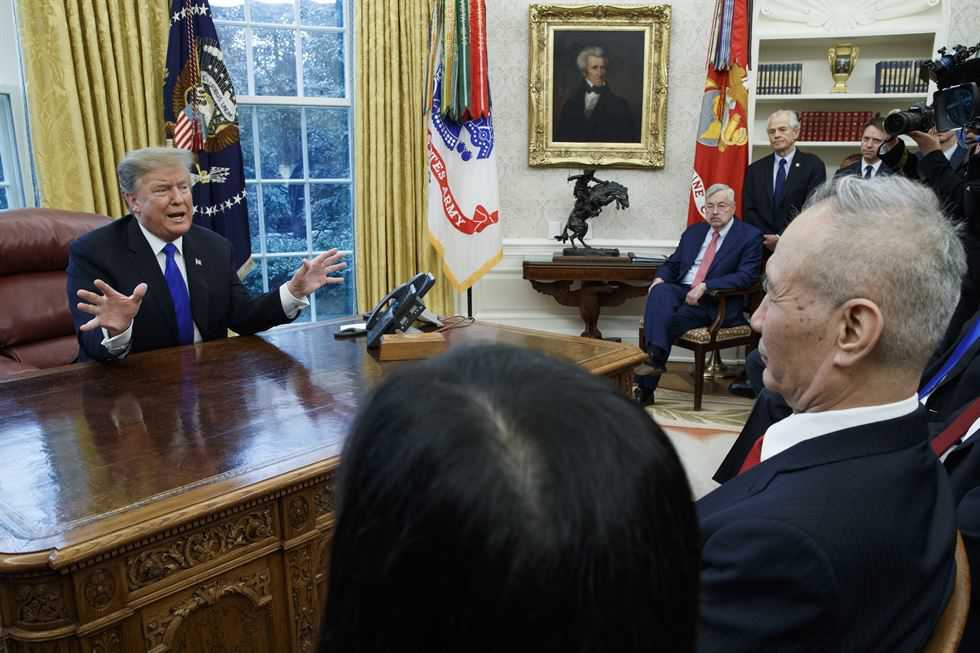China, US still have 'difficult discussions' ahead on trade issues
27 February, 2019

Washington and Beijing remain divided over the U.S.'s demand that China make structural changes to its economy, analysts say, despite the trade war truce's being extended.
U.S. President Donald Trump tweeted on Sunday that "substantial progress" had been made on intellectual property protection, technology transfer, agriculture, services and currency, after negotiators wrapped up two days of extended talks in Washington.
Trump also said he would push back the March 1 deadline for a boost in US tariffs on more than US$200 billion of Chinese goods, and that he would soon meet Chinese President Xi Jinping at Trump's Mar-a-Lago resort in Florida "to conclude an agreement".
China also offered to buy an additional 10 million metric tonnes of American soybeans during the latest round of talks, according to US Agriculture Secretary Sonny Perdue.
Trump's upbeat assessment of the trade war negotiations was echoed by China's official news agency Xinhua, which also reported "substantial progress" in the talks but said in a commentary that the two countries remained at odds over some issues and that new uncertainties could emerge.
US Secretary of Treasury Steven Mnuchin, US Trade Representative Robert Lighthizer and Vice Premier of the People's Republic of China Liu He participate in a US-China trade talk meeting in the Indian Treaty Room of the Eisenhower Executive Office Building in Washington, DC, USA, 21 January 2019. EPA-Yonhap
Brock Silvers, managing director of Kaiyuan Capital, said despite the truce extension, the US would be unlikely to stop pushing for structural changes to China's economy.
"Those issues have always been at the core of US demands," he said. "Yet the ongoing difficulties therein can't obscure that the [two] parties have made progress on a variety of issues. Trump has reasonably decided that such progress warrants a ceasefire extension."
Silvers also said it was "surely no coincidence that the extension was announced just prior to important talks in Hanoi between Trump and North Korea's Kim [Jong-un], in which the US would greatly benefit from Chinese cooperation".
"After the US-North Korea summit, look for China and the US to re-engage in difficult discussions over still unresolved structural trade issues," Silvers said, referring to the second summit between Trump and Kim held in Hanoi this week.
In one of his tweets on Sunday, Trump not only called the trade talks in Washington "productive" but also said the Chinese president "has been very helpful" over his upcoming meeting with the North Korean leader.
A man and a woman walk past an electronic stock board showing Japan's Nikkei 225 index at a securities firm in Tokyo Tuesday, Feb. 26, 2019. Most Asian share benchmarks are lower as a rally spurred by the Trump administration's decision to hold off on increasing tariffs on imported Chinese goods fades. AP-Yonhap
However, Shen Dingli, a Shanghai-based expert on China-US relations, said the omission of any mention of Beijing's subsidies for state-owned enterprises and its industrial policy indicated the two sides remained far apart on sensitive matters such as these.
"There is still a lack of progress on the more difficult issues, even though the trade talks were extended for two more days," Shen said.
It was unlikely China would give in on areas it considered to be "core interests" in subsequent negotiations, he added.
Wang Yong, director of the Centre for International Political Economy at Peking University, said while Beijing may be open to cutting subsidies for state-owned enterprises, the central role of the state sector in China's economy would not change.
"Trump has left room [for additional demands] in his tweets. After he discusses with [the leaders] of the Republican and Democratic parties, Trump could come back with more demands," Wang said.
